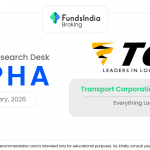

Kalyan Jewellers India Ltd
Founded in 1993, Kalyan Jewellers Ltd. is now among the largest jewellery companies in India. The company specializes in designing, manufacturing, and selling a variety of gold, studded, and other jewellery items across various price points. As of Q1FY25, Kalyan operates 241 showrooms in India and 36 in the Middle East. With over 12,000 employees, it has a presence in 23 states and union territories in India and five countries worldwide.

The company has announced plans to acquire a 15% stake in their e-commerce (digital-first jewellery platform) subsidiary Enovate (Candere), making it a 100% wholly owned subsidiary of the company. Currently operating 13 Candere showrooms, the company aims to expand that number to a total of 50 by the end of the financial year. It also has plans to enter the US market in FY25 by setting up one store each in New Jersey and Chicago. Notably, the company’s promoters have raised their stake in the company from 60.59% of Jun 2024 to 62.90% of Sep 2024, indicating a greater confidence in company prospects.
During Q1FY25, the company achieved revenue of Rs.5,536 crore, an increase of 27% compared to the Rs.4,376 crore of Q1FY24. Company EBITDA also improved by 16% YoY during the quarter to Rs.376 crore. PAT rose by 24% to Rs.178 crore. The company has delivered sales and profit CAGR of 29% and 367% respectively, over the last 3 years (FY2021-24). Average 3-year ROE and ROCE is at 12% each. Debt-to-equity is at Rs.1.07.

Outlook:
The company is targeting to open six jewellery showrooms in overseas markets and 130 outlets in India in FY25 (80 Kalyan & 50 Candere). It has given a capex guidance of Rs.250 crore for FY25. With scale-up of new franchise business, stable success in non-Southern business, store additions across diverse locations, new customer acquisition driven by improvement in studded jewellery share and strong same-store sales growth (SSSG) compared to its peers, we expect the company to continue its industry leading growth.
Risk:
- Regulatory Risk – The company is exposed to future regulatory actions that may affect its business profile.
- Competitive intensity – The company might be pressurised due to the competitive intensity in the jewellery sector, especially from the new entrants.
Central Depository Services (India) Ltd
Founded in 1999, Central Depository Services Ltd. (CDSL) is a Market Infrastructure Institution (MII), part of the capital market structure, providing services to all market participants – exchanges, clearing corporations, depository participants (DPs), issuers and investors. It is a facilitator for holding securities in the dematerialized form and an enabler for securities transactions. It also offers services to several subsectors of the capital markets such as securities, mutual funds, and insurance companies.

CDSL derives its operating income from fixed annual charges collected from the registered issuer companies and transaction-based fees collected from DPs, account maintenance charges from corporate account holders, and monthly maintenance charges from clearing members for maintenance of settlement accounts. Other consistent revenue-generating services offered by the company include IPO and corporate action charges, KYC charges paid by intermediaries, e-voting, email address updation facility for companies/issuers and e-notice services to registered companies. The company is proactively putting efforts into improving its technology offerings. During the quarter, the company launched new multi-lingual eCAS services, available in the preferred language of the investor and the multi-lingual chatbot.
Revenue for Q1FY25 increased by 65% to Rs.287 crore, up from Rs.174 crores in Q1FY24. Net profit rose by 81% to Rs.134 crore compared to Rs.74 crore in the previous year. As of Q1FY25, CDSL had 12.5 crore registered accounts opened compared to 8.8 crore in Q1FY24, making a 42% YoY increase. Leveraged growth of technology and extensive presence in Tier 3 and Tier 4 cities has aided in the company’s growth during the period. The company has generated revenue and net profit CAGR of 33% and 28% over the past 3 years (FY21-24). 3-year ROE and ROCE is at 29% and 37% respectively.

Outlook:
CDSL is actively investing in technology to improve its infrastructure, emphasizing hardware, application security, and top-tier technology platforms. The swift increase in demat accounts is anticipated to maintain this growth momentum. The company holds a monopoly in its sector. Management is optimistic about the company’s growth path, fuelled by rising retail participation in capital markets and strategic technological investments. We believe CDSL is well-equipped to seize upcoming market opportunities.
Risk:
- Regulatory risk – The company operates in a sector overseen by regulatory bodies such as SEBI. Any policies introduced that could impede the company’s operations may affect its revenue.
- Financial market related risk – Any decline in demat volume might impact the company financials.
JSW Energy Ltd
JSW Energy Ltd. is amongst India’s leading independent power producers with a locked-in platform capacity of 13.2 GW. The company holds 54% capacity in thermal, 33% in renewables, 11% in hydro and 2% in nuclear energy.

The company has signed a 25-year agreement to provide a total of 1,200 MW of solar-wind energy to the Maharashtra discom and has also partnered with Gujarat Urja Vikas Nigam Ltd. to deliver 192 MW of hybrid energy under a similar 25-year contract. It also signed a PPA with NTPC for a 700 MW ISTS/STU-connected solar project, expected to be commissioned in June 2026. The company is also constructing Asia’s largest battery energy storage system (1 GWh capacity).
During the quarter, revenue improved marginally to Rs.3,043 crore from Rs.3,013 crore in Q1FY24. EBITDA increased by 21% to Rs.1,581 crore compared to the Rs.1,307 crore of Q1FY24. The company reported a net profit of Rs.958 crore, which is a growth of 29% from the corresponding period in the previous year. YoY, EBITDA margin has improved from 43% to 52% and net profit margin improved from 25% to 31%. During the quarter, renewable energy generation increased by 44% YoY, hydro generation by 61% and thermal generation by 4% resulting in an overall 18% improvement in net generation. The company has generated revenue and PAT CAGR of 18% and 29% over the period of 3 years (FY21-24). The average 3-year ROE & ROCE is around 9% each for the FY 21-24 period. The company has a debt-to-equity ratio of 1.52.

Outlook:
The company has a target of achieving generation capacity of 20 GW & energy storage of 40 GWh before 2030. Management is optimistic about the growth opportunities presented by the evolving power sector landscape. The rising number of orders boosts confidence in the company’s ability to strengthen its market position and maintain its growth momentum. We anticipate that the company will perform strongly in response to the increasing energy demand.
Risk:
- Regulatory risk – Evolving policies and regulations can impact power generation, pricing, and market dynamics.
- Execution risk – Delay in the execution of renewable energy projects might slow down the company’s growth.
Federal Bank Ltd
Headquartered in Aluva, Kerala, Federal Bank Ltd. is a leading personal, NRI, business banking partner catering to a growing expanse of customer base, both in urban and rural areas. With a customer base of over 18.1 million, the company had 1,504 employees and 2,015 ATM/cash recyclers (as of FY24).

The company is gaining market share on deposits. It is expanding its geographical footprint, having opened 14 new outlets during Q1FY25. The company’s fixed deposit (short-term) and certificate of deposits enjoy the highest CRISIL rating in that class. The bank got featured in the Economic Times list of “Future Ready Organizations 2024-25 (Large Scale Enterprises)”, further enhancing the confidence in company prospects.
During Q1FY25, net interest income increased by 4% YoY to Rs.2,292 crore compared to the corresponding period in the previous year. Operating profit increased by 15% to Rs.1,501 crore and net profit surged by 18% to Rs.1,010 crore. Deposits and advances grew by 20% each YoY to Rs.2,66,065 crore and Rs.2,20,807 crore respectively. Gross non-performing assets (GNPA) improved from 2.38% to 2.11% and net non-performing assets (NNPA) improved from 0.69% to 0.60% YoY, indicating better asset quality. Return on Assets (RoA) was at 1.27% and ROE was at 13.64%. Net interest margin (NII) is at 3.16%.

Outlook:
Company’s high yielding segments such as credit cards and micro finance have improved its proportionate contribution during the quarter. The company added 140 branches during FY24. It has a target to add 100 branches during FY25. The company’s ability to sustain its growth trajectory and position in the industry under the new Managing Director is a key factor to lookout for.
Risks:
- Interest rate changes – Any changes in interest rate (repo rate) may affect the margins of the bank and hence the operation matrix.
- Competition risk – Increasing intensity of competition in the banking industry might pose a risk to the company’s growth momentum in the future.
Mankind Pharma Ltd
Mankind Pharma Ltd. specializes in developing, producing, and marketing a wide range of pharmaceuticals for acute and chronic conditions, as well as consumer healthcare products. It offers various dosage forms, including tablets, capsules, soft and hard gels, eye drops, contraceptives, syrups, creams, etc. Initially focused on delivering quality medicines to rural areas, the company gradually expanded into peri-urban regions and then into metropolitan and Tier-1 cities. The company has 30 manufacturing facilities (75% in-house manufacturing), capable of producing 43.5 billion units annually, and operates 6 R&D centers that have developed 23 brand families.

Mankind has acquired 100% stake in Bharat Serums and Vaccines Ltd. (BSV) for an enterprise value of Rs.13,768 crore. BSV specializes in the super specialty segment, focusing on women’s health, fertility, and critical care. To support future growth, the company is also establishing a new manufacturing facility in Genome Valley. Diversifying its product mix, the company is entering the analgesic market with the launch of Nimulid Strong, a gel and spray for neck pain, and has introduced self-test kits to address health challenges such as dengue, UTIs, and early menopause in India.
In Q1FY25, Mankind reported revenue of Rs.2,893 crore, a 12% increase from Rs.2,579 crore in Q1FY24. Operating profit rose 5% to Rs.686 crore, up from Rs.655 crore, while net profit increased by 10% to Rs.543 crore, compared to Rs.494 crore in Q1FY24. The company has achieved a revenue CAGR of 18% and a PAT CAGR of 14% over the past three years (FY21-FY24). Its average ROE and ROCE stand at 22% and 27%, respectively, with a strong capital structure reflected in a debt-to-equity ratio of 0.02.

Outlook:
With the acquisition of the high entry barrier super speciality business of BSV with little to no competition, that covers the entire women’s health spectrum, Mankind is targeting to be a market leader in the gynecology-fertility segment. The company’s strategy of constantly evolving its business strategy – starting from rural markets and expansion to metro cities & product mix diversification from chronic to consumer health care products looks promising.
Risk:
- Regulatory risk – The industry faces significant regulatory scrutiny, including potential limitations or bans on products by agencies like the USFDA, which could impact revenue and operations.
- Patent risk – Business operations could be impacted by the inability to defend patent challenges or third-party agreements.
Welspun Corp Ltd
Incorporated in 1995, Welspun Corp Ltd. (WCL) is a market leader in line pipes, along with other lines of business in infrastructure, pipe solutions, building materials, warehousing, retail, advanced textiles & home solutions, and flooring. The flagship company of the multinational conglomerate Welspun Group, WCL is one of the largest manufacturers of large diameter pipes globally and has established a global footprint across 6 continents and 50 countries delivering customised solutions for onshore and offshore applications.

The company has made the decision to acquire 100% of Weetek Plastics Private Ltd (WPPL). WPPL specializes in manufacturing plastic pipes (CPVC, UPVC, SWR), fittings, and water storage tanks, boasting a combined capacity of 19 KMTPA. Notably, a new plant is being established to enhance production. This move is anticipated to accelerate the company’s entry into the plastic pipes market. Additionally, the company plans to invest $100 million to enhance its high-frequency induction welding pipe manufacturing and coating capabilities in the US, aiming to enrich its product portfolio.
During Q1FY25, revenue declined by 23% to Rs.3,180 crore. EBITDA remained flat at Rs.416 crore whereas net profit improved by 50% to Rs.248 crore. EBITDA margin improved from 10% to 13% and net profit margin improved from 4% to 8% YoY. The company achieved these enhanced margins due to a more favorable product mix and contributions from new businesses. It has generated revenue and net profit CAGR of 34% and 18% over the period of 3 years (FY21-24). Average 3-year ROE & ROCE is around 12% and 13% for FY21-24 period. The company has a robust capital structure with a debt-to-equity ratio of 0.35.

Outlook:
The company boasts a strong order book, indicating a positive business outlook. Its new ventures are performing well, significantly enhancing margins and expanding the order book. The strategic acquisition of WPPL will expedite its entry into India’s plastic pipes market. Growing demand in oil and gas distribution, river interlinking, irrigation pipelines, and government initiatives like the Jal Jeevan Mission create a robust demand pipeline for the piping segment. Adopting a conservative stance for FY25, the company has set guidance of Rs.17,000 crore for topline, Rs.1,700 crore for EBITDA, and a 20% ROCE.
Risk:
- Forex risk – The company has significant operations in foreign markets and hence is exposed to forex risk. Any unforeseen movement in the forex market can adversely affect the company.
- Socio-economic risk – Any socio-economic instability that could result in an increase in input costs such as raw material, freight costs, etc. might negatively impact the margins and profitability.
Disclaimer
Note: to read the Disclaimer and Disclosure, click here.








